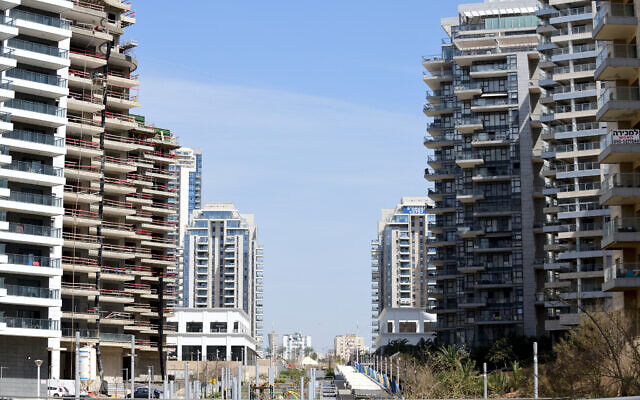Housing prices soar by more than 16% in past year, highest rise in over a decade
Consumer prices rise by 0.8% in April, 4% over past year, with notable upticks in fresh vegetables and fruits, clothing and footwear, transportation, culture and entertainment

Housing prices in Israel have surged by 16.3 percent over the past year, the biggest uptick the country has seen since 2010, according to a report released Sunday by the Central Bureau of Statistics. February-March saw housing prices climb 1.9%, the data showed.
Northern and central Israel saw the highest increase during February and March of 2022, 2.9% and 2.4% respectively. Haifa saw an increase of 1.8%, Tel Aviv 1.5%, Jerusalem 1.3% and southern Israel 1.2%.
Prices in central Israel are up 18.5% over the past year; in Jerusalem 16.7%; in Tel Aviv 16%; in Haifa 14.9%; in northern Israel 13.8%, and in southern Israel 12.3%.
The nationwide average rent rose to NIS 4,153.6 (about $1,220) in the first quarter of this year from NIS 4,112.6 in the previous one.
Governments have promised to lower ever-climbing housing prices for more than a decade. The sky-high costs have put home ownership out of the reach of many Israelis, weakening the middle class.
Finance Minister Avigdor Liberman said in December that housing prices would “moderate” by the end of 2022, and that he believes Israelis may even see prices drop in the coming years.
Economists and experts have said that the new government plans were a “drop in the bucket” and do not address the underlying issues such as rapid population growth, government-controlled supply, lack of infrastructure, and rising inequality.

The statistics bureau also published a report Sunday on consumer goods.
The consumer price index in Israel rose by 0.8% throughout April 2022, according to the new data.
Since the beginning of 2022, there has been a rise of 2.3%, and over the past 12 months, the consumer price index has risen by 4%.
The CPI measures the average cost of household goods. Particular rises were seen in fresh vegetables and fruits (5.5%), clothing and footwear (2.8%), transportation (2.3%), and culture and entertainment (1.5%)
However, communication costs dipped 1.2%, according to the data.
Outrage over sky-high housing costs and the rising cost of living has been growing across the country, more than a decade after Israel last saw widespread social unrest on the matter.
The CPI’s rise also culminates with a 4% rise in inflation over the past year, the highest it has been in nearly 11 years.
While climbing, Israel’s inflation rate remains relatively low compared to other countries, such as the US, where it rose to 8.3% over the past 12 months and 7% in the EU.









